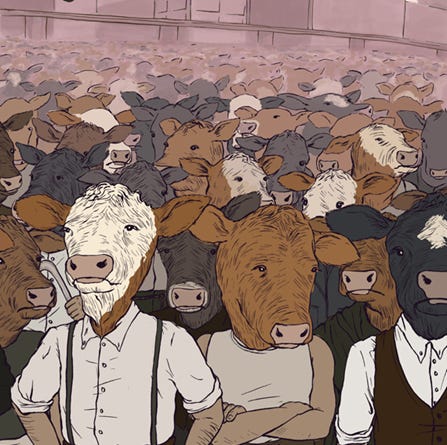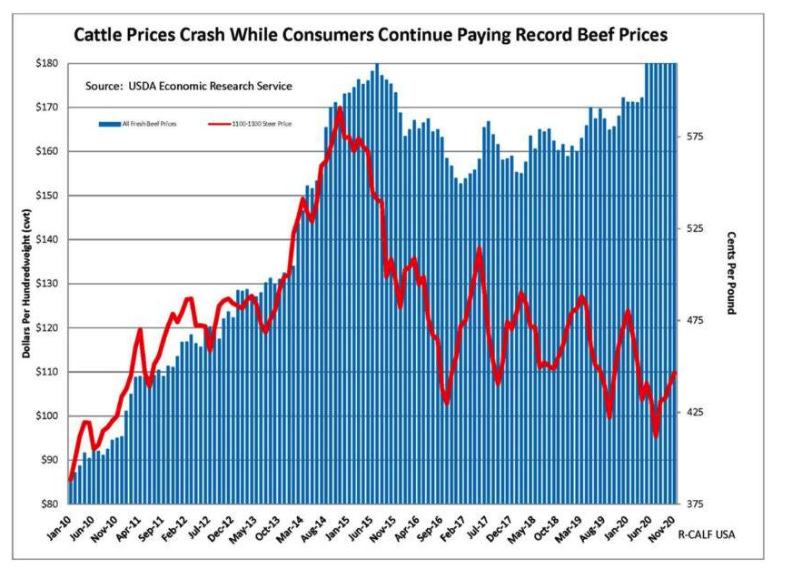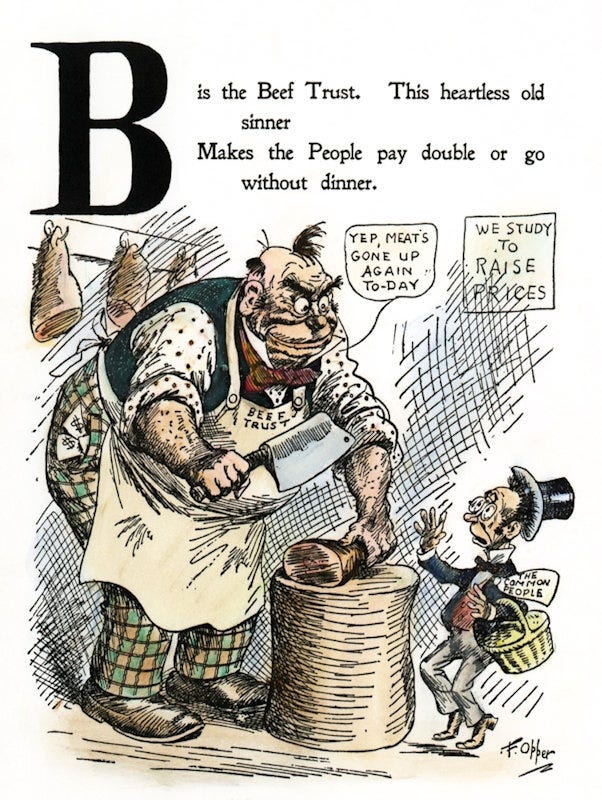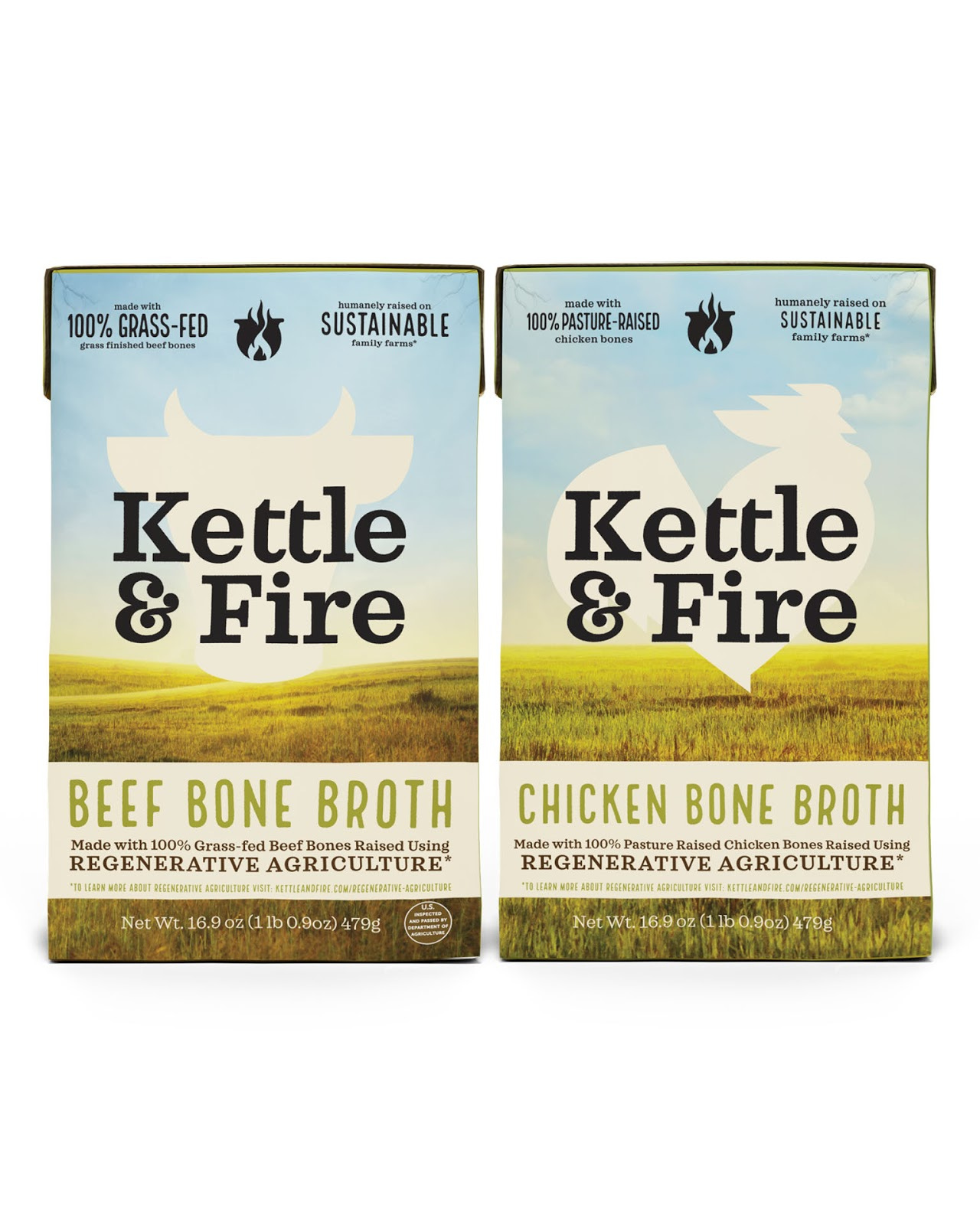🔪Carving up the Meatpacking Cartel
Reckoning: Harkening back to the trust-busting days of President Teddy Roosevelt and the scrutiny on meatpacking caused by Upton Sinclair’s The Jungle, President Biden’s administration has unleashed a flurry aimed at breaking up the predatory and anti-competitive practices of the major four beef processing companies, who together process over 80% of U.S. cattle: Cargill, Tyson Foods, JBS, and National Beef Packing Co. After over forty years of laissez-faire policy and tacit support, Biden’s Executive Order pushes to “promote competition in the agricultural industries and to support value-added agriculture and alternative food distribution systems.”
Starting during the 1970s, when Secretary of Agriculture Earl Butz promoted the mantra of “get big or get out”, the industrialized meat processors used the excess profit to concentrate ever greater market share. The packers have vertically integrated the industry, as they own “feeder cattle”' which, through futures contracts, ranchers sell at pre-agreed prices to packers. Consolidation creates a “captive” supply that allows packers to control the market, most clearly in regions where they are the only buyer, at the expense of the ranchers they work with. consolidation in the beef processing sector, which mirrors different major agricultural markets, hurts farmers and consumers, while maximizing corporate profits - without any requisite value delivered in the following ways:
Vulnerability: The COVID-19 crisis and recent cybersecurity failures point at the dangers of this system to our food supply chain disruptions at a massive scale. From workers facing hazardous conditions that have led to the big four processors still facing labor shortages to a March 2019 fire in a Tyson Foods plant that knocked out 5% of U.S. beef production(more than 6,000 cattle a day), the current infrastructure lacks proper safeguards for resilience. In addition, consolidation has actually led to fewer cattle being processed during the 2007-2019 period, according to Derrell S. Peel of Oklahoma State University.
Economic Inviability for Producers: With ranchers forced to work with these major processors, the meatpackers have been able to generate higher returns from rising beef prices - all the while, in the past five years, farmers’ share of the price of beef has dropped from 51.5% to 37.3%. As Iowa Senator Chuck Grassley noted, packers can make $800 to $1,200 per cow in markets while ranchers lose money on the same animal. Ever tight margins have forced numerous producers to either sell their most valuable asset, their land, without any gain in product quality or price to the consumer.
Lack of Transparency: To make matters worse, consumers have a hard time voting with their dollar as the meatpackers obfuscate their sourcing. As we previously discussed in The Regeneration Weekly, “since Congress rescinded the country of origin labeling (COOL) requirement in 2015, foreign-produced meat may now be falsely, and yet legally, be labeled “Product of USA'' as long as it passes through a USDA-inspected plant (a requirement for all imported beef).” Meatpackers, who have fought COOL since its inception in 2013, stand the most to gain from cheaper international sourcing.
In response, the Biden administration has enacted a series of executive measures, complemented by legislation and litigation, to start fixing our broken system. With support from both historically liberal and conservative agriculture advocacy groups, the following measures are gaining momentum:
Capacity Building: Biden’s executive order allocates over $650 Million to rebuild a competitive marketplace and expand America’s processing capacity. More than $150 million is earmarked for existing small and very small processing facilities, particularly to reduce burdensome inspection fees, while $500 million will go towards funding new entrants into the market. These grants will allow independent processors to invest in labor and better technology in order to offer ranchers competitive scale and pricing. In effect, the government is directly funding competitors to the big four.
Litigation: On top of recent litigation alleging price-fixing, most notably the Agri Stats class-action lawsuit which started with a single farmer going after the big players and a data platform that enabled price-fixing, the Executive Order also calls for strengthening the Packers and Stockyards Act to curb unfair and unjustly discriminatory practices. USDA investigations uncovered a particular need for cattle market price transparency and discovery. Furthermore, the Federal Trade Commission, in line with the Executive Order, has passed guidance on “Made in USA” fraud, with the USDA looking to do the same. These new regulations and agency positions open up new avenues for litigation for regulators, producers, and consumers throughout our judiciary system.
Legislation: Senator Cory Booker has introduced the Farm System Reform Act, which would place a moratorium on building new large-scale concentrated animal feeding operations (CAFOs), force feedlots of more than 1,000 cattle to close by 2040, and introduce a voluntary buyback program for CAFO owners wishing to exit their operation. CAFOs produce billions of tons of waste, pollute local ecosystems, and emit potent greenhouse gases. Though the bill had little traction when first introduced in 2019, congressional legislation remains a crucial avenue for the Biden administration and the agriculture antitrust movement to consolidate its gains. Other relevant legislation re-introduced includes the PRIME Act, which bypasses the USDA-inspected sites and provides small-scale growers with greater processing options nearby
The government’s loose three-pronged approach, combined with private sector innovations, will help producers get a fair price for their goods and opens the door to scaling a more robust and regenerative animal protein supply chain. Indeed, both the recent CREO report and Guidelight Strategies’ Barriers For Farmers & Ranchers To Adopt Regenerative Ag Practices In The US report highlight that processing infrastructure is a necessity for regenerative agriculture to scale. Some startups, like Friesla, are building out local meat processing facilities that can serve small-scale processing needs. Independent processors experienced an unprecedented boom during COVID-19. Mid-sized processors like Lorentz Meats can serve as a successful scalable model moving forward, particularly focusing on grass-fed cattle. Indeed, even tangential legislation like the Growing Climate Solutions Act, which helps standardize voluntary soil carbon markets, will create financial pathways for ranchers to divest themselves from the current industrialized meat processing cartel.
Across the board, the government’s aggressive first steps present the most promising opportunity for catalyzing systemic change in the beef industry in decades. As both conscious consumers and citizens, it is imperative to buy from producers who partner with independent processors and advocate for our elected officials to build strong local and regional processing infrastructure.
Listen: On this episode of Ranching Reboot, sponsored by our friends at PastureMap, Brian Alexander and C.K. Wisniewski sat down with Mike Callicrate to talk about all manner of things from cattle markets, his operation, to small community slaughter plants and public meat spaces. Callicrate shares valuable lessons learned from fighting against the commodity production system and how he’s built his own independent pathway to the consumers. This insider look at the independent producer side provides a unique perspective that can enable consumers to look more deeply at where their beef comes from, and how to vote for change with their dollars. If you like this episode, make sure to listen to this bonus episode for more commentary on how policy can help change the beef industry for the better!
Shop: Kettle and Fire’s new beef bone broth and chicken bone broth are made with bones exclusively sourced from farms committed to regenerative practices, including from Cooks Venture, which has implemented systems that help sequester atmospheric carbon and reduce emissions. Kettle & Fire is available in 12,000 doors nationwide and online, offering a variety of shelf-stable bone broths and soups for all eating and snacking occasions. In conjunction with the product release, Kettle & Fire is partnering with The Steward Foundation, the not-for-profit arm of Steward, to provide grants to select U.S. livestock ranchers working to put more acres under regenerative practice. The bone broths also contain no artificial ingredients, preservatives or flavors, are made with only organic ingredients, are keto and paleo friendly, are Non-GMO Project Verified, and contain no antibiotics or hormones. The Regeneration Weekly readers can use the code “REGEN'' at checkout to receive a special discount of 15% through 7/20. Learn more about Kettle & Fire’s efforts here.
Disclaimer: The Regeneration Weekly receives no compensation or kickbacks for brand features - we are simply showcasing great new regenerative products.
The Regeneration is brought to you by Wholesome Meats | Soilworks | Grassroots Carbon| Grazing Lands





